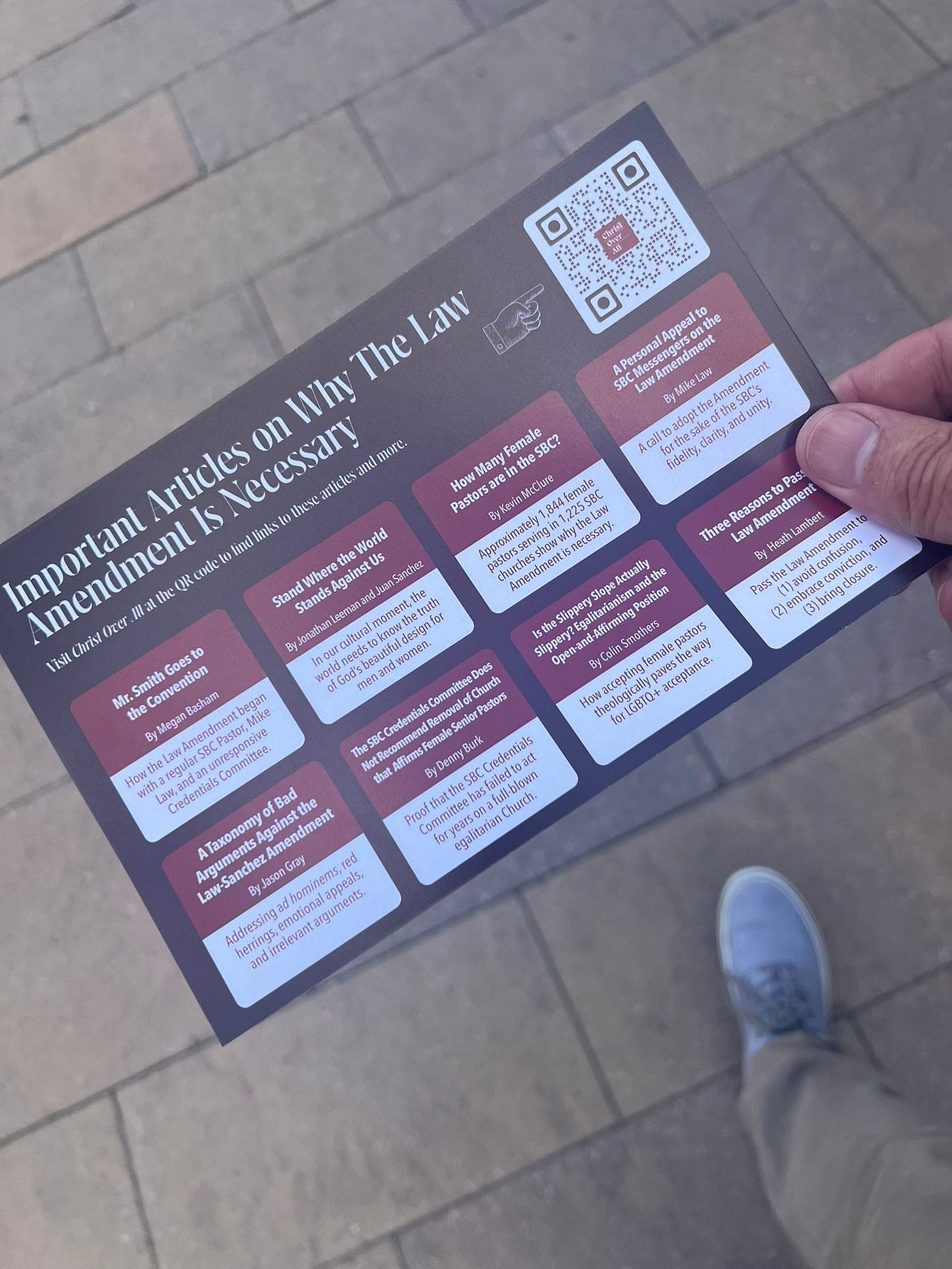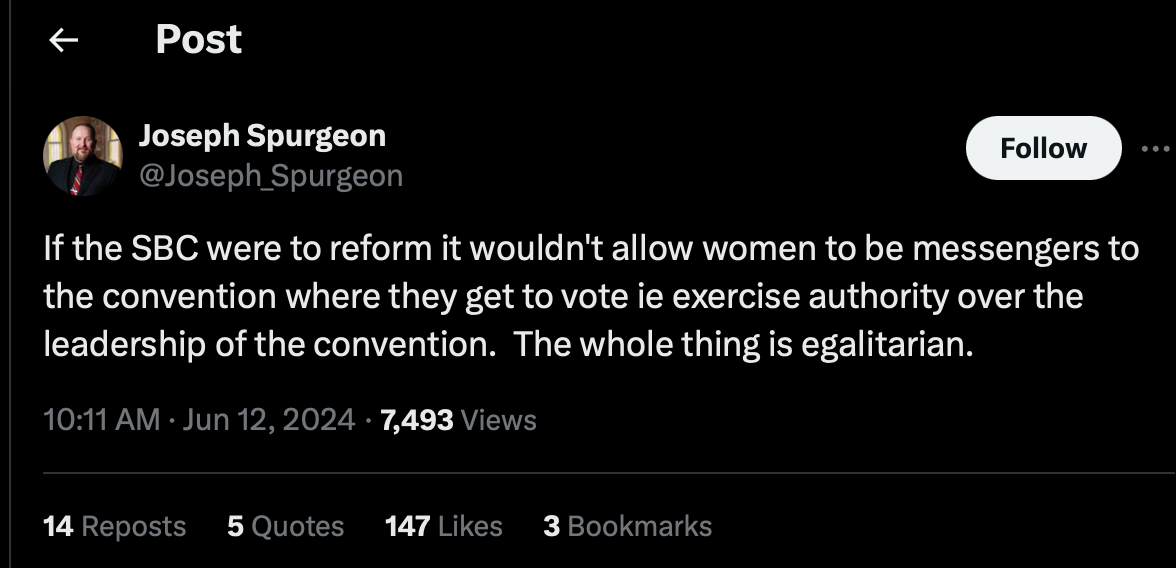"This isn't over"...The defeat of the Law Amendment isn't a victory
But it has shown the world clearly who the SBC is

Liam Adams has helped me better understand the SBC quagmire I walked into with the publication of The Making of Biblical Womanhood in 2021.
On the one hand, I knew what I was getting into. Even though my husband was not fired from an SBC church in 2016 (although the theology is SBC-adjacent and I argue influenced considerably by the SBC), both he and I had grown up SBC; been baptized (us) and ordained (him) in SBC churches; graduated from an SBC seminary (him); and served in ministry for the first few years of our marriage in SBC churches. Not to mention we both had attended a Baptist undergraduate university at which I now have worked since 2002. Our Baptist credentials, even SBC credentials, are solid.
On the other hand, I had not been paying close attention to SBC politics between 2018 and 2021. While I knew about the significant attention the 2019 convention paid to abuse reform, I did not realize the level of backlash that was mounting in response to the increasing visibility of SBC women in leadership. Liam Adams helped put this in perspective for me.
“That groundswell of empowerment has also sparked a rising backlash that has left many women questioning their place in the church as the denomination struggles to balance traditional gender beliefs and a growing push for women in leadership,” he writes. “Rhetoric against women’s influence in the SBC has pushed out leading voices such as popular author Beth Moore and disincentivized other Southern Baptist women to speak up. Some of those same women remain optimistic about the future of women’s participation in Southern Baptist life. But the 180-degree turn in the past six years has also laid bare the volatile state of the politics of women in the SBC.”
My scholarly gut (if I can put it that way) considers the SBC central to the rise and spread of complementarian theology, which connects to the devaluing of women both in ministry and as humans made in the image of God. My forthcoming book, Becoming the Pastor’s Wife, reflects my scholarly gut (as well as the historical evidence I followed in the evolution of the Pastor’s Wife role) as it focuses much more on the SBC than did The Making of Biblical Womanhood.
The near-success of the Law Amendment—a proposed change to the SBC constitution that defined churches in “friendly cooperation” with the SBC as only those not employing women in any pastoral roles—provided more evidence of the prominent role played by the SBC within the evangelical web of complementarian theology as well as of the increasingly exclusionary “gospel” embraced by the SBC.
Let me just connect some dots for you (and I am indebted to a friend who sent me these images).
First, this flyer was apparently being given out in support of the Law Amendment at #SBC24. Just take a look at the names.
I know some of them through my experience with The Making of Biblical Womanhood. In case you don’t know who the eight names mentioned on the flyer are, two of them are influential members of The Council for Biblical Manhood and Womanhood (CBMW), which is housed at The Southern Baptist Theological Seminary (SBTS) in Louisville, KY, (where Albert Mohler presides). The CBMW, despite SBC roots, claims to be broadly conservative evangelical—including board and council members representing the SBC, Desiring God ministries, Reformed Theological Seminary, Dallas Theological Seminary, Sovereign Grace ministries, and Talbot School of Theology.
One name on the flyer represents 9marks ministries which is led by an SBC pastor but seeks broadly to equip evangelical pastors and churches around the world with practical resources.
One of the authors is on the board for The Gospel Coalition, a self-described “fellowship of evangelical churches in the Reformed tradition” attempting to combat divisive elements in the church by providing a unified resource and “true coalition for Jesus”. Please note that, like the SBC, CBMW, and 9marks, TGC is complementarian.
One of the authors is an SBC pastor, professor at SBTS, author for CBMW and TGC, editorial board member for the CBMW journal, and Executive Director for the Association of Certified Biblical Counselors.
One of the authors serves as a contributing scholar for the Center for Baptist Leadership, which states that their employees “will affirm, at a minimum, the Baptist Faith & Message 2000 and the Chicago Statement on Biblical Inerrancy. Our employees must also hold settled convictions on human sexuality and biblical gender roles that are at least as rigorous as those set forth in the Nashville Statement on Human Sexuality and the Danvers Statement on Biblical Manhood and Womanhood.”
One of the names is on the “Christ Over All” team, which produced the pro-Law Amendment flyer. Christ Over All self-identifies as “Reformed Baptists” but welcoming of other “Reformed and Protestant traditions” and considers the term “biblical nationhood” to be a better descriptor than “Christian nationalism.” “Not only does this label affirm the place of nations in our world and in God’s word, but it also doesn’t carry all the baggage that comes when something holy (Christianity) is fused with something profane (state).”
I encourage you to explore the websites for The Gospel Coalition, the Council for Biblical Manhood and Womanhood, DesiringGod, the Center for Baptist Leadership, Christ Over All, 9marks, and The Southern Baptist Theological Seminary. What you will find is an extensive amount of crossover not only among their board but also among their contributors, conversation partners, and faculty. Kate Shellnut noted on how some of these auxiliary groups like The Center for Baptist Leadership and 9marks participated in meetings at the SBC 2024.
Of the remaining two names on the list, one is the SBC pastor who proposed the Law Amendment and one is an SBC church member and reporter at the Daily Wire.
In short, the Law Amendment is about the SBC, but the most avid supporters of the Law Amendment are part of an influential web of conservative evangelical networks that actively promote a theological vision of male headship and female submission and often excludes those who do not support that vision.
The SBC exemplifies this exclusionary attitude. Take for example, what just happened at the recent SBC convention with a Texas church. The SBC North American Mission Board (NAMB)—which is “all about the gospel” according to current president Kevin Ezell—admitted that it will not support church planting efforts by SBC churches affiliated with the Baptist General Convention of Texas (BGCT) because the BGCT affirms the Baptist Faith & Message (BF&M) 1963 instead of the BF&M 2000 (which enshrines complementarianism).
Let me clarify this for those of you unfamiliar with Texas Baptists.
Texas Baptists maintain cooperation among complementarian and egalitarian churches (although they have begun excluding LBGTQ affirming churches). BGCT (Texas Baptist) churches that affiliate with the SBC, which means they also contribute to the SBC cooperative program, ARE NOT SUPPORTED by the SBC because they also cooperate with the BGCT. As Dustin Slaton, the pastor of FBC Round Rock stated at the SBC24, “I want to lead my church to start complementarian Southern Baptist churches—gospel-preaching churches. And I want to do that with NAMB. And I want to do that with the Baptist General Convention of Texas.” Slaton also noted that his church has been a faithful financial partner of the SBC and no one told him that the partnership would not be reciprocated because his church affiliates with Texas Baptists.
The SBC North American Mission Board refused Slaton’s appeal.
I find this attitude jarring for a denomination born in cooperation and advancing the gospel. Exclusion based neither on the gospel nor on historic Baptist beliefs but rather on a very narrow scriptural interpretation of a handful of New Testament verses rules the SBC. The subtitle for The Making of Biblical Womanhood rings even truer now than it did in 2021: “How the Subjugation of Women Became Gospel Truth.”
As my husband said today: “It’s interesting to realize that if your church affirmed the ministries of Deborah, Huldah, Anna, Phoebe, and Junia, you would not be welcome in today’s Southern Baptist Convention and they would not partner with you in any way.”
Texas Baptists are now welcoming churches outside of Texas to the BGCT. If I were the SBC, I would pay attention. I also hope Texas Baptists are paying attention to how much the exclusionary attitude of the SBC is impacting the Baptist evangelical mission.
Second, please note that the only SBC candidates who made it to the presidential ballot were supporters of the Law amendment. The candidate who did win, Clint Pressley, exemplifies the complementarian evangelical networks both fed by and feeding the SBC.
Take, for example, Colin Smother’s response to the failure of the Law Amendment.
Smothers, for those of you who do not know, is the executive director of the Council for Biblical Manhood and Womanhood. He was a messenger at the 2024 SBC, and he spoke his admiration for his fellow board member and (then) SBC presidential candidate Clint Pressley.
Pressley’s church is also a member of The Gospel Coalition, and Pressley himself serves as a trustee for The Southern Baptist Theological Seminary (which means he serves with Al Mohler). The SBC pastor who nominated Pressley, Chris Justice, serves as pastor for Megan Basham, one of the authors listed on the Law Amendment flyer who recently appeared on the podcast for the Center for Baptist Leadership.
Pressley was also hosted at the 2024 SBC on a 9marks panel “On the State of the SBC.” He spoke alongside Mark Dever, Al Mohler, Danny Akin, Bart Barber, and HB Charles on cooperation within the convention and complementarianism.
The Law Amendment failed by a mere 500 or so votes to enshrine the most rigid limits ever placed on women’s ministry in (I think) SBC history.
But given the powerful complementarian networks supporting the Law Amendment, not to mention a new Southern Baptist president who is completely engulfed by these networks, I think the fight is far from over.
If I were you, I would think hard about staying with the SBC.
It isn’t a safe place for women
It isn’t a safe place for those who disagree with complementarianism.
It isn’t even a safe place for complementarians who cooperate, in the historic Baptist spirit, with other Baptists.
And if I were the SBC, rather than focusing on excluding more people, I’d be more concerned about the people who are already leaving.
Later today or tomorrow I’m going to tell you about a more encouraging part of the Baptist world before returning to the less-uplifting connection between the Law Amendment and sex abuse reform within the SBC.
Be free, y’all.












I can't even read your report--it sends me into anger and tears. Scanning, my eye was caught by your need to surround the word gospel with quotation marks when referring to the "good news" as currently taught by the SBC.
Next I gagged to see that the right is trying to replace the term "Christian nationalism" with "biblical nationhood"--just as CBMW in 1987 tried to replace the words "inequality" or "patriarchy" with that six-syllable monster "complementarianism."
The exec director of CBMW wants to be president of the Southern Baptist Convention? Say no more. A buddy of Al Mohler.
And women voting at this convention is exercising authority and therefore not biblical? "The whole thing is egalitarian," which equals bad?
In the 1980s and 90s, I watched the SBC being taken over by these egoist males. They insisted that women pastors of SBC churches become chaplains in prisons or hospitals--example: Nancy Sehested.
As Randall Balmer and others report, the SBC in the 1970s voted four times to continue legal access to abortion as ruled by the Supreme Court. Then Paul Weyrich in 1978 found a way to mobilize white evangelicals into voting activists.
We are still witnessing the backlash to biblical feminism, jumpstarted in 1974 by the publication of All We're Meant To Be by Letha Dawson Scanzoni and Nancy Hardesty, but actually centuries old.
Thank you, Beth and others, for continuing to witness to the good news preached by Jesus to both women and men. "All will be well, and all will be well, and all manner of thing will be well," as Julian of Norwich said.
Thank you very much for all your efforts to put this news into historical perspective and to explain the names. I am going to message you about translation research I have been doing after being inspired by a book study my pastor did with your book.